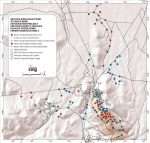
Gold stocks have suffered a miserable few years, becoming a laughingstock even among contrarians. But this despised sector’s seemingly-endless downward spiral has left gold stocks vastly undervalued relative to gold, which drives their profits. The fundamentally-absurd disconnect between gold-stock price levels and gold can’t last. And it sure looks ready to end, making 2015 the year gold stocks shine again.
Any stock is a fractional ownership stake in a corporation, entitling shareholders to participate in that company’s profits. So over time, any stock price ultimately reflects a reasonable multiple of these very underlying earnings. If a stock price falls too low relative to corporate profits, investors step in to buy shares cheap bidding their prices higher. And the opposite is true if a stock grows too expensive relative to earnings.
In the gold-mining industry, the price of gold is the dominant driver of corporate profits by far. Mining costs are largely determined by the particular deposit being mined, and are largely fixed when any mine is designed and constructed. So gold miners’ profits are almost totally dependent on the price of gold. The higher it happens to be, the larger their margins grow since their costs generally don’t change much.
This dynamic is what has long made gold stocks attractive to investors. When the gold price rallies, the profits of gold miners rocket higher much faster. If a miner can produce gold for $900 an ounce, and sell it for $1200, its profits are $300. But if gold merely climbs 25% higher to $1500, that same miner’s profits double to $600. This inherent profits leverage to gold makes the gold stocks really amplify gold’s moves.
But as in all stock-market sectors, this key fundamental relationship between earnings and stock prices can be temporarily derailed by sentiment extremes. Sometimes investors get greedy, and bid gold-stock prices up far higher than their gold-driven profits could ever support. And other times they get scared, selling so aggressively that prices fall far below their earnings-supported levels. Great fear has plagued gold stocks.
This has hammered this sector to truly fundamentally-absurd levels relative to the metal that drives its profits. The leading gold-stock index is the NYSE Arca Gold BUGS Index, widely known by its symbol HUI. Back in early November, this gold-stock-sector measuring rod was crushed down to 146.8. The last time this index had been lower was a whopping 11.3 years earlier all the way back in July 2003.
The problem was these recent extreme lows were spawned by overwhelming fear, not underlying profits fundamentals. In early November 2014, the gold price fell just under $1150. But the last time the HUI had been so low over a decade earlier, gold was trading near $350. Does it make any sense at all for gold stocks to be trading at the same levels despite gold being 3.3x higher? No, it’s a crazy fear anomaly.
Gold stocks are priced as if gold was just 30% of its prevailing levels today. Imagine this same kind of vast fundamental disconnect in another industry. What if Apple’s stock was trading at levels reflecting it selling just 30% of the iPhones it’s actually selling? Investors would rush to buy it, knowing full well that extreme sentiment-driven fundamental anomalies never last for long. Why should gold stocks be any different?
And make no mistake, investors will return. Between the birth of gold stocks’ secular bull in November 2000 and its peak in September 2011, the HUI skyrocketed a mind-boggling 1664% higher! This nicely leveraged gold’s own 603% gain over that span, and trounced the benchmark S&P 500’s 14% loss. The investors who were willing to buy gold stocks cheap back in the early 2000s earned vast fortunes over a decade.
But sentiment started to turn in 2012, when the HUI slipped 11% despite gold gaining 7%. And 2013 was the year of QE3, the Fed’s wildly-unprecedented debt-monetizing money printing that spawned an incredible stock-market levitation. As the US stock markets inflated dramatically on nothing but Fed hot air, alternative investments like gold were wholesale abandoned. Why buy gold when stocks are soaring?
So in 2013 the HUI plummeted 55% to gold’s 28% loss. Truly gold stocks should have bottomed after such an extreme down year, as fear in this sector was off the charts. And indeed they spent most of 2014 regaining ground, but that great progress collapsed in recent months. Now year-to-date, the HUI has dropped 20% to a mere 2% gold loss, reflecting the ongoing extreme and irrational fear in this sector.
But gold stocks can’t fall relative to gold forever, they can’t be forced into a situation where their various earnings multiples are merely a fraction of the broader stock markets’ indefinitely. Like everything else in the markets, the relationship of gold-stock prices to gold levels is forever cyclical. Greedy uplegs push gold stocks well above reasonable levels relative to gold, then fearful corrections hammer them back below.
As this chart reveals, that relationship has swung the latter direction for far too long. Which means a major reversal is imminent, certainly in 2015. Plotted here is the popular GDX Gold Miners ETF as a gold-stock metric, in addition to the relationship between this and the GLD SPDR Gold Shares gold ETF. The GDX/GLD Ratio shows where gold stocks are trading relative to gold, which ultimately drives their profits.

Just this week, the GDX/GLD Ratio slumped to 0.149x. In other words, GDX’s share price was trading at just over 1/7th of GLD’s. Incredibly this is the lowest level ever witnessed, in these terms gold stocks have never been cheaper relative to gold! GDX was born in May 2006, the last time gold stocks were in favor. And even during 2008’s once-in-a-century stock panic, the GGR merely plunged to 0.227x at worst.
And that stock panic was almost certainly the greatest fear event we’ll witness in our lifetimes. The VIX fear gauge skyrocketed up to an astounding 81 in November 2008, epically high. So it’s mind-boggling that gold stocks are now much cheaper relative to gold than they were even in that incredible fear super-storm. That is supremely irrational and reflects the extreme fear-driven fundamental anomaly dogging this sector.
In absolute terms, GDX’s price fell to $16.59 in early November 2014. That was its worst levels in 6.0 years, since a single day near the stock panic’s climax in October 2008 where GDX briefly fell to $16.37 before bouncing sharply higher. So gold stocks have never been or almost never been more out of favor than they are today when measured in both relative-to-gold and absolute terms. It’s just a crazy anomaly.
And this devastating sentiment trend has been in place since late 2007, as evidenced by the GGR’s secular-resistance line shown above. When this key fundamental gold-stock ratio is falling, gold stocks are losing ground relative to gold. Gold, as represented by GLD, has been outperforming gold stocks on balance ever since. But gold stocks’ relationship to gold is forever cyclical, making this an extreme aberration.
In gold-stock uplegs, the equities outperform the metal so the GGR rises. In gold-stock corrections, the metal doesn’t fall as fast as the stocks so the GGR falls. So if you think of the gold price as a straight line, gold-stock price levels oscillate around that like a sine wave. Outperformance is always followed by underperformance which soon yields to outperformance again. And this cycle continues into perpetuity.
Typically this sentiment-driven oscillation sees gold-stock uplegs that run for up to several years on the outside, followed by gold-stock corrections that typically take 6 months or so. But incredibly today, the gold stocks have been underperforming gold on balance for an astounding 7.1 years! This makes zero sense fundamentally given prevailing gold prices of recent years, so it is solely the product of extreme sentiment.
The main thing that pushed this gold-stock underperformance into such extreme bear territory is the Fed’s hyper-manipulative QE3 campaign. Note above that gold stocks had bottomed and were climbing sharply in 2012 before the Fed hatched its QE3 scheme. But as QE3 convinced stock traders the Fed would arrest any material stock-market selloff, they abandoned alternative investments including gold stocks.
As the general stock markets soared with the Fed’s implied backstop in QE3, gold and its miners’ stocks were crushed. The worst of the selling came in 2013’s second quarter, when gold plummeted 22.8% in its worst quarterly loss in 93 years! GDX collapsed 35.3% in that span, the most extreme selling seen in gold stocks since late 2008’s panic. And they’d started recovering nicely this year, until recent months.
With the Fed’s QE3 manipulations enticing or forcing most investors into the dangerously-overvalued US stock markets, investors have largely been absent from the gold market. This has given American futures speculators carte blanche to run amuck. So in the last couple years the gold price has been dominated by their leveraged trades, particularly short-side bets. And recent months saw extreme gold-futures shorting.
As gold temporarily broke below its $1200 support zone in late October and early November, many remaining gold-stock investors capitulated. After years of misery, they finally gave up on this seemingly cursed sector. But that in itself is a major bottoming indicator, a major downside washout after years of falling prices. And that is one of the key components setting us up for a massive gold-stock upleg coming in 2015.
Why 2015? The sole reason gold suffered such an extreme down year in 2013 was the Fed’s stock-market-levitating QE3 campaign. Every time the stock markets started to sell off, the Fed either stepped in to jawbone them back higher or traders assumed it would. But after being born in September 2012 and ramping up to full steam in December 2012, the Fed finally killed off QE3’s new bond buying in October 2014.
With QE3 gone, and any QE4 a political impossibility for the Fed with the new Republican Congress, the stock markets just lost their driver that pushed them to such wildly overextended and overvalued levels. So sooner or later here, a major stock-market selloff is going to erupt and start cascading. And the Fed won’t be able to act to slow it down. It lost its window to monetize more debt, and interest rates are already at zero.
As this stock-market selloff persists, likely gradually growing into a new cyclical bear, the Fed-devastated alternative investments led by gold will return to favor. And as gold inevitably rebounds, the radically-undervalued gold stocks are going to soar. The Fed’s stock-market levitation killed gold in 2013, and the end of the Fed’s stock-market levitation in 2015 will restore gold. Gold stocks will simply amplify gold’s ride higher.
And their upside potential is truly epic. Once again, this week the GGR slumped to an all-time low of 0.149x. In the initial two-and-a-half years after the stock panic, this gold-stock valuation metric averaged a far-higher 0.419x. Merely to return to those normal-year levels, GDX (and the HUI) would have to nearly triple with a massive 182% gain! Can you imagine any other stock-market sector with such potential in 2015?
And the last time gold stocks were actually in favor with investors was before the stock panic. The pre-panic average GGR in the first eight calendar quarters of GDX’s existence was 0.591x. If gold stocks actually returned to favor again, which is certainly possible in a weak general-stock environment, they would at least quadruple from current levels. And I say at least for a couple reasons, gold and smaller gold stocks.
When the lofty US stock markets inevitably roll over and enter their overdue down cycle, gold is going to catch a major bid. Once again investors will start remembering the millennia-old wisdom of prudent portfolio diversification, so capital will flood back into the yellow metal. And given the extreme degree of underinvestment in the gold asset class today, this re-diversification is going to launch gold much higher.
As of the end of November, the 500 elite stocks of the S&P 500 had a collective market capitalization of $19,217b. Meanwhile GLD, the vehicle of choice for stock investors to gain gold exposure, was valued at just $28b. For centuries at least, the best investment advisors have recommended everyone have at least 5% of their portfolio in gold. But for our purposes today, let’s assume that can rise to merely 1%.
Today stock investors have just 0.15% of their capital in GLD as compared to their S&P 500 allocation. To get to 1%, which is still quite low historically, the amount of capital in gold at today’s prices would have to soar 6.9x! That much buying alone, not even counting traditional physical-gold investment, would certainly catapult the beaten-down gold price far higher. And that would flow through to the GGR.
As gold rallies, so will GLD which tracks the gold price. That means any given GGR will necessitate much-higher gold-stock levels. For example, back in 2012 before the Fed’s QE3 manipulations goosed the stock markets and decimated alternative investments, gold averaged just under $1675. That’s an amazing 41% above today’s levels! If gold just returned to pre-QE3 levels, gold-stock prices would soar accordingly.
Because of GLD’s annual 0.4% management fee over its decade since inception, it now trades at about 96.1% of the gold price. So let’s call $1675 gold $161 in GLD-share-price terms. At those levels and the initial post-panic-average GGR of 0.419x, GDX would have to rocket over $67. That’s a 275% upleg from current depressed gold-stock prices! Again, what other sector can quadruple from stock-market highs.
But gold-stock investors’ gains are likely to be even larger if they choose the right stocks. GDX and the HUI are dominated by the major gold miners, which have less upside potential than smaller gold miners. The large elites are so massive that it will take far more capital to overcome their inertia and drive their stock prices higher. The greatest performers in the next gold-stock upleg will be the best of the smaller miners.
GDX’s biggest holdings are mega-miners Goldcorp, Barrick Gold, and Newmont Mining. They have market capitalizations around $14.8b, $12.7b, and $9.5b today. It takes a lot of investor buying to push larger stocks higher. But the best of the smaller gold miners and explorers have market caps ranging from $0.1b to $2.5b, far smaller than the majors. So it will take far lower capital inflows to blast them higher.
A carefully-handpicked portfolio of the best of the smaller gold miners and explorers will trounce the coming gains in GDX and the HUI. The sheer profits leverage to gold many of these smaller miners have is breathtaking. And if they’ve survived this terrible and fearsome winnowing of the past couple years, they have cut costs to the bone. So their profits are going to explode higher as the gold price inevitably normalizes.
The bottom line is gold stocks are set to shine again in 2015. They’ve fallen relative to gold for far too long, driven by the impact of the Fed’s brazen stock-market manipulations on gold. But with QE3 done and any QE4 now politically impossible, the stock markets’ implied backstop has vanished. Without the Fed’s support, the next major selloff is going to be far larger. That will start bringing investors back to gold.
As gold rebounds and normalizes in this post-QE3 era, the wildly-undervalued gold stocks are going to just soar. Despite gold being way up near $1150 at the recent gold-stock lows, this sector was merely trading as if it was $350! This insane fundamentally-absurd disconnect can’t last for long, as all stocks are ultimately bid to levels reflecting their underlying earnings. So gold stocks are heading far higher soon.



 Follow us on Twitter
Follow us on Twitter Become our facebook fan
Become our facebook fan











Comments are closed.